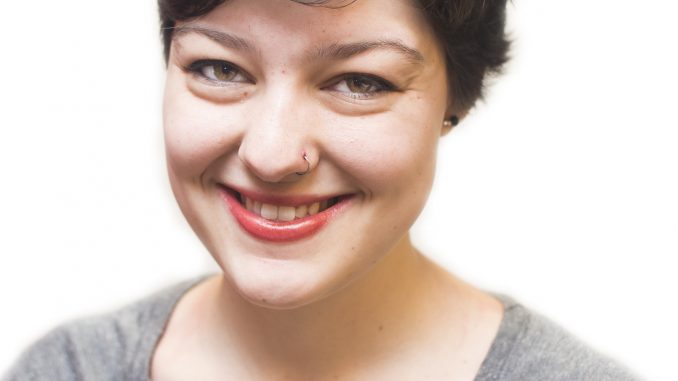
 Last year, my editor told me it might be a good idea to change my Twitter bio. He didn’t think “Manic Pixie Drunk Girl” sounded very professional.
Last year, my editor told me it might be a good idea to change my Twitter bio. He didn’t think “Manic Pixie Drunk Girl” sounded very professional.
“I don’t even use curse words on Twitter anymore,” he said. “I’m applying to grad school. People can see that.”
Social media has become so pervasive that his concerns were not unreasonable. This scares me. Employers and graduate schools that scour profiles contribute to this to some extent, but their involvement is more likely the result of a much more ingrained mindset.
The other day, my barista was wearing a tag with his Instagram handle written on it. So, as I waited for my coffee, I took out my phone and followed him. I’ve participated in entire conversations based on the subtle implications of somebody’s tweets. A friend of mine crafts his Facebook statuses so meticulously that he’s asked me to copy-edit them. He posts them during what he calls “MLT,” which stands for Maximum “Like” Time – this ensures that his statuses receive the attention they deserve.
In short, social media is in our heads. And when the quality of our jokes, quips and insights can be quantified with likes, retweets and favorites, it makes sense that millennials have begun to market our personalities as tangible products.
Naturally, actual marketers immediately saw potential in this.
Ben Harrison, a junior finance major, is known to his nearly 20,000 Twitter followers as @PajamaBen_. Harrison uses Klout, a website and mobile app that measures users’ “social media influence” on a scale from 1-100.
“It measures how much your word is worth,” he said. “My score is 61.”
This number further serves to quantify users’ content. A 2012 Wired article cited a businessman who was denied a job because his Klout score wasn’t up to the company’s standards.
In addition, Klout offers “perks” to users with high scores. For instance, Harrison’s feed consists largely of original, slightly absurdist jokes. Many of them happen to have to do with dogs.
“I got an email from Klout saying that Purina wanted to give me a free one-pound bag of dog food because of my influence in the pet community,” Harrison said. He gets two or three offers a month from Klout. Other rewards he received include books, business cards and razors.
“I didn’t even have to pay for shipping,” he said.
Klout’s website is littered with the kind of capitalistic language that makes me shiver in my sleep at night, like “networking,” “career” and “marketing.” Even for those of us who aren’t budding Marxists, Klout, especially its rewards program, is a disturbing concept.
Celebrity endorsement as a form of advertisement is not a new idea. If a picture is released of a Kardashian sister in a T-shirt plastered with Chanel’s logo, most of us realize that Chanel has succeeded in advertising its products for next to nothing – simply by dispensing free merchandise to celebrities who will doubtless receive national exposure.
Programs like Klout are taking this concept to a new level by infiltrating the Twitter, Instagram and Facebook feeds of, for lack of a better term, normal people. Their goal is for these people to mention the product to some capacity, so they seek out users with higher Klout scores.
Harrison said that although he’s happy to receive free stuff, he doesn’t tweet about it.
“I don’t want to alienate my followers,” Harrison said. “But there are a lot of people who just want everything.”
Many people, if told that simply tweeting a hashtag will earn them a prize – or even a chance at one, as with the 5.4 million people who tweeted #EsuranceSave30 during the Super Bowl – comply without a second thought. And as a result, Esurance, although it gave away $1.5 million, likely more than made up for that number with the amount of free advertising Twitter brought it.
What are the repercussions of this? Perhaps there are none.
“I like it because I get free things, and from a business standpoint it’s also good. It’s no harm to anyone,” Harrison said.
But I am skeptical. Defenders of big business like to emphasize the value of the free market – in fact, the whole point of capitalism is allegedly the agency that each member of the system has.
Another fundamental aspect of capitalism, though, is how tricky the corporations are. This is the same system that had people in the 1950s up in arms over subliminal images of Coca-Cola and Camels in their feature films – and now, with the advent of social media’s widespread influence, advertising is cheaper and sneakier than ever.
I suppose, for those who are entirely unbothered by the idea of their friends becoming billboards for whatever company decided to grant them with free products that month, there is nothing wrong with the “perks” that Klout offers.
But as we remove tags from incriminating photos and change our Twitter bios to look better to prospective employers, we can no longer deny the incestuous relationship social media has with our outside lives. As millennials reap the admittedly plentiful advantages that social media offers us, it might be wise to be wary of the drawbacks as well.
Grace Holleran can be reached at holleran@temple.edu and at twitter @coupsdegrace


Be the first to comment